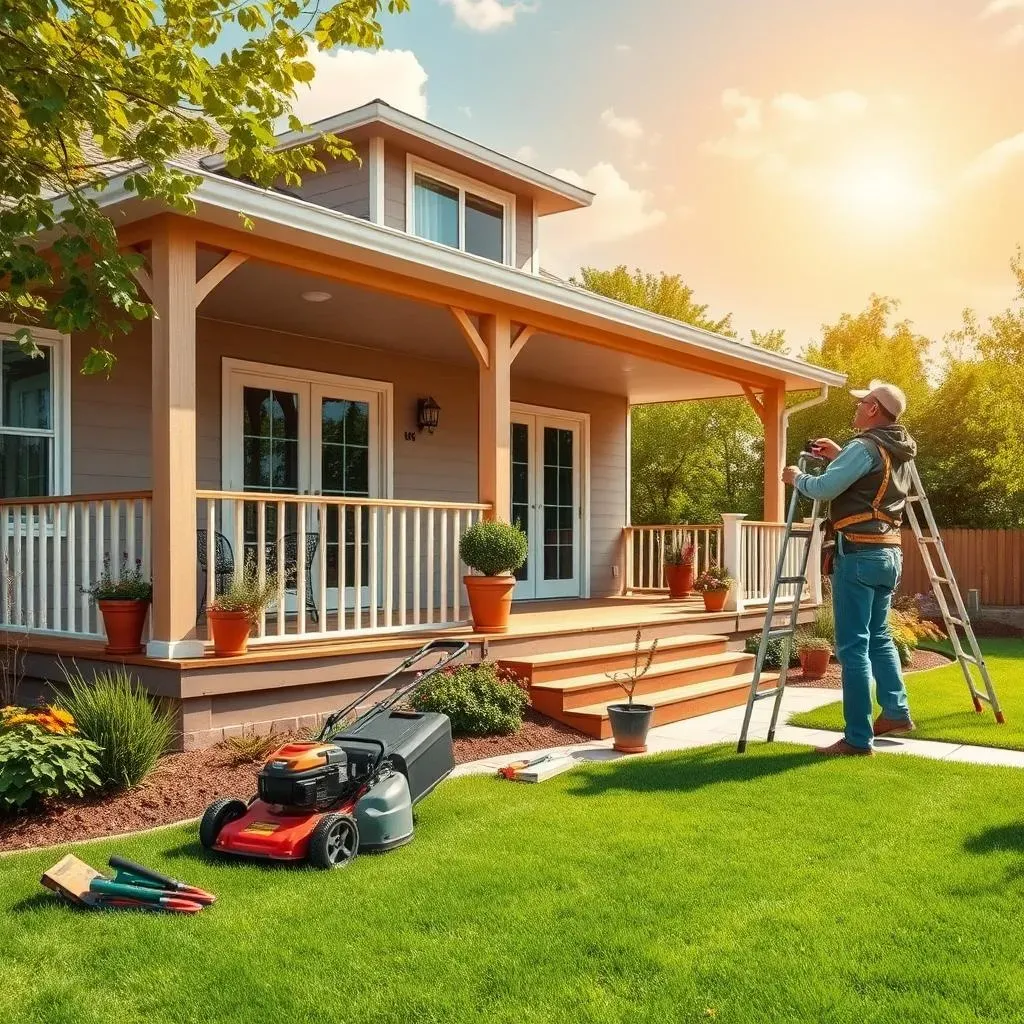Table of Contents
Feeling overwhelmed by the never-ending to-do list that comes with owning a home? Don't worry, you're not alone! Maintaining a household can feel like a Herculean task, but with the right approach, it can be manageable and even enjoyable. This article provides your ultimate guide to conquering home chaos with a comprehensive household maintenance checklist. We'll break down the essential tasks into manageable monthly routines and seasonal strategies, helping you prevent costly repairs and keep your home running smoothly. Forget the frantic searches for that leaky faucet fix or the last-minute scramble for winterizing your pipes. This isn't about perfection; it's about a proactive approach to homeownership, saving you time, money, and stress. Get ready to ditch the overwhelming feeling and embrace a simpler, more organized way to manage your home. We'll cover everything from simple monthly checks to seasonal deep cleans, even when to call in the professionals. Ready to transform your home maintenance from a chore to a well-oiled machine? Let's get started with your personalized household maintenance checklist!
Monthly MustDos: Keeping Your Home Ticking
Monthly MustDos: Keeping Your Home Ticking
Plumbing and Water Systems
Think of your plumbing like the circulatory system of your home. Every month, take a few minutes to check for leaks under sinks and around toilets. Listen for unusual noises from pipes – a gurgling sound might signal a blockage. Also, check your water heater for leaks and ensure the temperature is set correctly (around 120°F to prevent scalding and save energy). A little preventative care now can save you from a major plumbing headache later. Regular checks also ensure you catch problems before they become expensive disasters. For more in-depth tips on maintaining your furnace, check out our guide on essential home furnace maintenance.
Don't forget to check your water pressure! Low water pressure can indicate a problem with your main water line or a leak somewhere in your system. High water pressure, on the other hand, can damage your pipes and appliances. Most homes have a pressure regulator; check your owner's manual or call a plumber if you're unsure where it is.
Check Item | Frequency | Action |
|---|---|---|
Leaks under sinks/toilets | Monthly | Visually inspect and listen for unusual sounds. |
Water heater | Monthly | Check for leaks and temperature setting. |
Water pressure | Monthly | Check pressure gauge (if available) or look for signs of low/high pressure. |
Electrical Systems and Safety
Electricity is essential, but it can also be dangerous if not treated with respect. Monthly, test your smoke and carbon monoxide detectors. Replace batteries if necessary. These are lifesavers, so don't skip this crucial step. Also, make sure that your circuit breakers aren't overloaded and that none of your outlets are sparking or loose. If you are unsure about any of these steps, it is always best to call a qualified electrician to take a look. For a more comprehensive look at home maintenance, check out our Home Maintenance for Dummies guide for DIY tips.
Don't forget the outside! Check the exterior outlets for damage or wear. Water damage to exterior outlets is a significant safety hazard. If you find any issues with your electrical system, don't try to fix them yourself; call a qualified electrician immediately. You can also learn more about managing your budget for home maintenance by reading our guide on home maintenance budgeting.
- Test smoke and carbon monoxide detectors
- Check circuit breakers for overloading
- Inspect outlets for sparks or looseness
- Inspect exterior outlets for water damage
Appliance Check-Up
Your appliances work hard for you. Give them some love back! Monthly, clean the lint trap in your dryer thoroughly. A clogged lint trap is a fire hazard. Also, check the refrigerator coils (usually located on the back or bottom) for dust buildup. Dust restricts airflow and makes the refrigerator work harder, leading to higher energy bills and potential failure. Vacuum or brush off any dust to keep things running smoothly. For more specific examples of home maintenance, take a look at our guide on examples of home maintenance.
Cleaning out your refrigerator is also a monthly task that often gets overlooked. Cleaning out your fridge regularly will prevent spoiled food and make it easier to find what you need. You can also check your dishwasher for any clogs or issues. If your dishwasher isn't cleaning as well as it used to, you may need to use a cleaning tablet to remove mineral build-up. Regular appliance maintenance will increase their lifespan significantly, saving you money in the long run. Learn more about the costs associated with home maintenance with our guide on home maintenance costs.
Seasonal Strategies: Spring, Summer, Fall, and Winter
Seasonal Strategies: Spring, Summer, Fall, and Winter
Spring into Action: A Fresh Start for Your Home
Spring cleaning isn't just a cliché; it's a crucial part of seasonal home maintenance. Think of it as your home's annual health check-up. Start by cleaning out gutters and downspouts, ensuring water flows freely away from your foundation. Inspect your roof for any damage from winter's harsh weather – missing shingles or damaged flashing can lead to costly repairs down the line. Don't forget the exterior! Power wash siding, decks, and patios to remove winter grime and mildew. A good spring clean will make your home look and feel brand new. For more spring cleaning tips, check out our ultimate spring home maintenance checklist.
Now's also the time to tackle those outdoor projects. Inspect your lawn for damage and fertilize as needed. Check your sprinkler system to ensure it's working properly and adjust as needed for the changing weather. If you have a deck or patio, clean and refinish it to protect it from the elements. A little preventative care now will save you headaches and money later. Our guide on essential summer home maintenance will help you prepare for the warmer months.
- Clean gutters and downspouts
- Inspect roof for damage
- Power wash exterior surfaces
- Inspect and fertilize lawn
- Check and repair sprinkler system
- Clean and refinish deck/patio
Summertime Sanity: Protecting Your Home from the Heat
Summer brings sunshine and warmth, but it also brings challenges for your home. Regularly check your air conditioning system to ensure it's running efficiently. Change or clean air filters, and consider scheduling professional maintenance to prevent breakdowns during those hot summer days. Make sure your home is well-ventilated to prevent overheating, and don't forget about pest control. Ants, wasps, and other unwelcome guests are more active in the summer months. Regularly inspect for signs of pests and take appropriate action to keep them out. For more tips on maintaining your home in the summer, check out our essential summer home maintenance tips.
Summer is also a good time to inspect your windows and doors for drafts. Caulk any gaps or cracks to keep cool air inside and warm air out. This will help keep your energy bills down and improve the overall comfort of your home. Remember to clean your outdoor furniture and grill regularly to keep them in good condition. For a complete guide on annual home maintenance, see our article on annual home maintenance costs.
Task | Frequency | Notes |
|---|---|---|
Check/clean AC filters | Monthly | Consider professional maintenance |
Inspect for pests | Weekly | Take action to prevent infestations |
Check windows/doors for drafts | Once | Caulk gaps to improve energy efficiency |
Autumnal Adjustments: Preparing for Cooler Weather
As the leaves change color, so should your home maintenance routine. Autumn is all about preparing for the colder months ahead. Clean your gutters again—leaves and debris can clog them, leading to water damage. Inspect your roof again for any damage that might have occurred during the summer months. Check and clean your fireplace and chimney to ensure they're safe and ready for use. For a comprehensive checklist for fall home maintenance, consider this November home maintenance checklist.
Don't forget about your heating system! Have your furnace inspected and serviced by a professional to ensure it's running efficiently and safely. Replace or clean air filters to improve air quality and efficiency. Check your smoke detectors and carbon monoxide detectors and change batteries if needed. It's essential to be prepared for potential winter storms, so winterize outdoor faucets and pipes to prevent freezing. Learn more about preparing your home for winter with our essential home boiler maintenance tips.
Advanced Home Care: Preventative Maintenance and Professional Help
Advanced Home Care: Preventative Maintenance and Professional Help
Preventative Maintenance: Small Steps, Big Savings
Think of preventative maintenance as a proactive approach to homeownership—it's like giving your house a regular check-up at the doctor's office. By addressing small issues before they become big problems, you can save yourself a lot of money and stress in the long run. For instance, regularly cleaning your gutters prevents water damage to your roof and foundation, and lubricating squeaky hinges prevents them from breaking completely. This approach is all about catching issues early before they escalate into expensive repairs. A little bit of effort now can save you from a major headache later! For more simple and effective solutions, check out our guide on ultimate home maintenance solutions.
Regularly inspecting your appliances is another crucial aspect of preventative maintenance. Cleaning the lint trap in your dryer, checking the refrigerator coils for dust, and ensuring your dishwasher is free of clogs can extend the life of your appliances and prevent costly replacements. Regular inspection also ensures you don't miss potential problems. Don't forget to check your water heater annually for sediment buildup and flush it as needed. This simple task can significantly extend the life of your water heater and improve its efficiency. For more details on annual maintenance, check out our annual home maintenance cost guide.
- Regular gutter cleaning
- Lubricate squeaky hinges and doors
- Inspect appliances for issues
- Annual water heater flushing
When to Call a Pro: Knowing Your Limits
While many home maintenance tasks are DIY-friendly, some jobs are best left to the professionals. Attempting complex repairs yourself can lead to further damage, increased costs, and even safety hazards. For example, electrical work, plumbing repairs, and HVAC maintenance should always be handled by licensed and insured professionals. These tasks require specialized knowledge and tools, and attempting them without proper training can be dangerous. Remember, safety should always come first. For help finding local maintenance services, check out our guide on monthly home maintenance services.
Similarly, roof repairs, chimney inspections, and major appliance repairs often require specialized equipment and expertise. Don't hesitate to call a professional if you're unsure about a particular task. Getting a professional opinion can help you avoid costly mistakes and ensure the job is done correctly. It's always better to err on the side of caution when it comes to your home's safety and well-being. For a more detailed look at home repair and maintenance tips, check out our general home repair and maintenance tips.
Task | Professional or DIY? | Reasoning |
|---|---|---|
Electrical work | Professional | Safety hazard |
Plumbing repairs | Professional | Requires specialized tools |
HVAC maintenance | Professional | Complex systems |
Building a Home Maintenance System: Consistency is Key
Creating a robust home maintenance system isn't about tackling everything at once; it's about establishing consistent habits. Start by creating a simple checklist tailored to your home's specific needs. This checklist should include both monthly and seasonal tasks, along with notes on when professional help might be necessary. Consider using a digital tool or a physical binder to keep track of your progress and schedule tasks efficiently. Consistency is key to preventing costly repairs and keeping your home in top shape. For a template to help you organize your home maintenance, check out our home maintenance binder template.
Remember, this isn't a race; it's a marathon. Start with small, manageable steps, and gradually incorporate more tasks as you become more comfortable. Celebrate your successes along the way, and don't be afraid to ask for help when needed. Building a strong home maintenance routine is an investment in your home, your peace of mind, and your financial well-being. For a monthly checklist that you can follow, check out our home maintenance checklist by month.